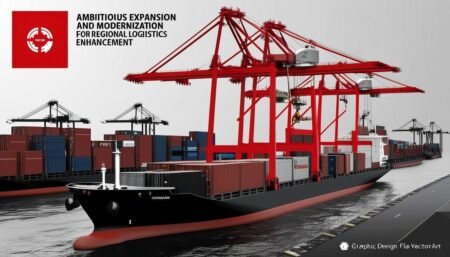Trade finance marketplaces are transforming international transactions by bridging gaps between buyers, sellers, and financial institutions while promoting efficiency and transparency.
Trade finance marketplaces are increasingly becoming essential conduits for managing international transactions, as they leverage innovative technologies to enhance the trading experience between buyers and sellers. These digital platforms efficiently bridge the gap among various stakeholders, including financial institutions, thereby facilitating transparent and secure trading practices. The role of trade finance marketplaces is critical as businesses contend with the nuances of global trade, propelling both growth and collaboration.
Trade finance marketplaces can be defined as digital platforms that aggregate buyers, sellers, and financial institutions, streamlining the multitude of processes that characterise international trade. They offer a range of services, including invoice financing, supply chain financing, and working capital solutions, to ensure businesses have the requisite financial support for transactions. By digitising traditional trade finance practices, these platforms significantly reduce paperwork, shorten processing times, and enhance overall transparency.
The significance of trade finance in global commerce cannot be overstated. It serves as a foundation for cross-border transactions by providing the necessary financial instruments to facilitate trade, mitigate risks, safeguard timely payments, and improve liquidity for businesses. Traditional trade finance systems can often be slow and cumbersome, especially for small to medium-sized enterprises (SMEs) that aspire to compete on an international level. The advent of trade finance marketplaces aims to democratise this access, allowing SMEs to concentrate on growth rather than overwhelming administrative complexities.
One of the core elements driving trade finance marketplaces is automation. Advanced algorithms paired with artificial intelligence (AI) enable these platforms to automate critical processes such as credit assessments, document verification, and transaction tracking. This automation minimises human error and accelerates the transaction completion process. Moreover, transparency is a cornerstone feature of these platforms. They provide real-time updates and visibility into transaction statuses, increasing trust among parties involved—especially vital in an international context marked by communication barriers and differing time zones.
To mitigate risks inherent in international trade, trade finance marketplaces supply a variety of tools. These include credit insurance, payment guarantees, and fraud detection mechanisms, which collectively help secure transactions and protect all parties. Accessibility remains another major advantage; these platforms cater to businesses of various sizes, ensuring that even SMEs have appropriate financing solutions.
The operational workflow of trade finance marketplaces typically begins with registration and onboarding, where businesses and financial institutions undergo identity verification and credit evaluation. Buyers and sellers subsequently post their trade requirements, which are reviewed by financial institutions that then propose tailored financing solutions. The platform matches parties with suitable institutions, facilitating negotiations and contract finalisation through digital means. Once agreements are reached, transaction execution follows, which involves processing payments, document verification, and compliance checks, alongside offering post-transaction services such as performance analytics and dispute resolution.
The advantages these marketplaces bring to the table are substantial. Cost savings are often realised through the elimination of intermediaries, which considerably reduces expenses associated with traditional trade finance mechanisms. The speed of transactions is another key benefit; while traditional processes may take weeks or even months, trade finance marketplaces expedite these procedures, leading to faster access to funds. Furthermore, their global reach connects businesses with a diverse network of potential partners, creating new opportunities for expansion. Enhanced security features, including blockchain technology and AI-enhanced fraud detection, give additional assurance to all parties involved.
Nonetheless, trade finance marketplaces do face their own set of challenges. Regulatory compliance is complex, as navigating the varied legal and regulatory frameworks of international trade presents significant obstacles. Additionally, awareness of these platforms remains limited, with some businesses reluctant to embrace digital solutions due to unfamiliarity. Data security concerns are paramount, necessitating substantial investment in cybersecurity measures. The integration of these digital platforms with legacy systems also poses challenges that require considerable technological investment and employee training.
Looking to the future, trade finance marketplaces are predicted to grow substantially. Emerging technologies such as blockchain, AI, and the Internet of Things (IoT) promise to enhance the capabilities of these platforms further. Blockchain can provide a decentralised, immutable ledger for transaction records, effectively reducing fraud and speeding up processing times. AI offers the potential to analyse extensive data sets, forecast market trends, and enable better decision-making, while IoT devices could allow for real-time tracking of goods during transit.
The ongoing evolution of trade finance marketplaces will also depend on increased collaboration among various stakeholders, including governmental bodies, financial institutions, and tech providers. This collaborative environment will foster an ecosystem that nurtures innovation and growth.
In summary, trade finance marketplaces significantly reshape how businesses engage in global trade. By connecting the various stakeholders involved—buyers, sellers, and financial institutions—these platforms streamline complex processes, reduce operational costs, and enable businesses of all sizes to flourish within the global marketplace. While challenges exist, the trajectory towards enhanced technology and cooperative efforts among stakeholders indicates that trade finance marketplaces will play a pivotal role in the future of international commerce, promoting efficiency, transparency, and growth.
Source: Noah Wire Services
- https://sell.amazon.in/grow-your-business/amazon-global-selling/blogs/trade-finance – Corroborates the benefits of trade finance, including reduced risk, improved cash flow, and enhanced confidence between trading parties.
- https://www.business.hsbc.co.id/en-gb/insights/raising-finance/the-importance-of-trade-financing-for-your-business – Supports the importance of trade finance in reducing risk, improving working capital, and providing greater oversight of funds and documentation.
- https://klearstack.com/what-is-trade-finance/ – Explains how trade finance manages financial risks, ensures timely transactions, and improves cash flow management, which is crucial for global commerce.
- https://www.mckinsey.com/industries/financial-services/our-insights/reconceiving-the-global-trade-finance-ecosystem – Discusses the benefits of modern trade finance ecosystems, including cost reductions, access to liquidity, and reduced transaction complexity.
- https://sell.amazon.in/grow-your-business/amazon-global-selling/blogs/trade-finance – Details how trade finance facilitates access to new markets by managing risks such as non-payment and non-delivery of desired goods.
- https://www.business.hsbc.co.id/en-gb/insights/raising-finance/the-importance-of-trade-financing-for-your-business – Highlights the role of trade finance instruments like documentary collections, documentary credits, and letters of guarantee in facilitating efficient trade flows.
- https://klearstack.com/what-is-trade-finance/ – Explains how trade finance enhances cash flow management and reduces financial risks associated with international trade.
- https://www.mckinsey.com/industries/financial-services/our-insights/reconceiving-the-global-trade-finance-ecosystem – Discusses the potential of an interoperability layer in the trade finance ecosystem to attract new credit capacity and enhance efficiency.
- https://sell.amazon.in/grow-your-business/amazon-global-selling/blogs/trade-finance – Supports the idea that trade finance improves cash flow by providing upfront funds and extended payment periods.
- https://www.business.hsbc.co.id/en-gb/insights/raising-finance/the-importance-of-trade-financing-for-your-business – Corroborates the importance of trade finance in providing greater oversight of funds and documentation, thereby increasing control over the import and export process.
- https://klearstack.com/what-is-trade-finance/ – Details how trade finance facilitates trade relationships by providing reliability and security through tools like letters of credit and export credit insurance.
















